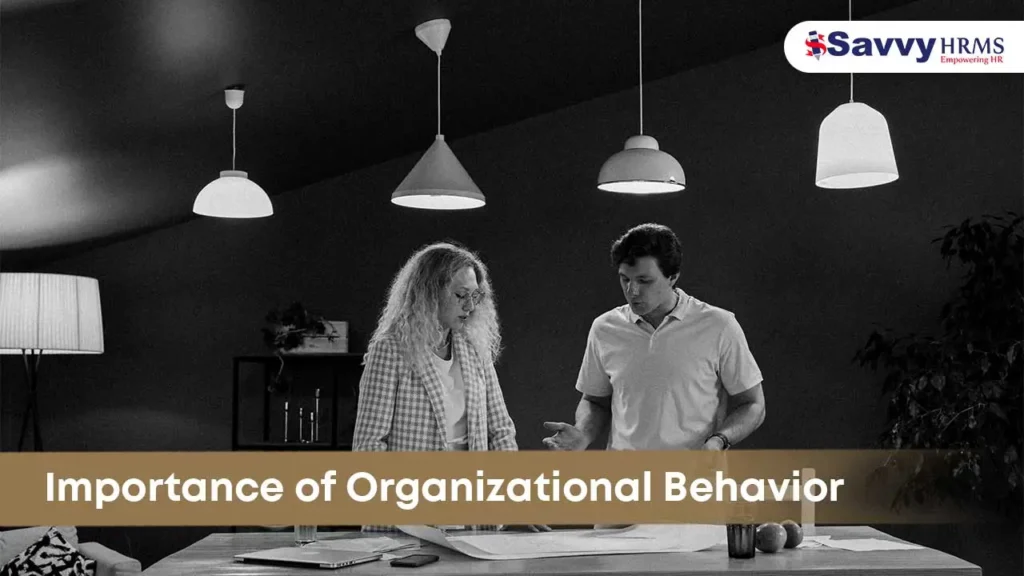Understanding the importance of organisational behaviour is vital! In today’s fast-paced work environment. Organisational behaviour creates how we interact, cooperate, and perform individually or collectively. To produce a company. It affects performance, work relationships, and company culture. All of which relate to performance and long-term success.
In this blog, we will better understand organisational behavior and its importance, as well as understand how it can help people perform better in the workplace.
What is Organisational Behaviour?
It is the study of how individuals & groups behave within the organization. The importance of organizational behaviour is drawn from psychology, sociology, hr management, and other professional fields.
In very basic terms, this is the understanding of:
- How employees think and act
- How groups and teams work
- How Leadership Impacts Morale
- How does all of this relate to performance in the business?
Why is Organisational Behaviour Important?
Before we start discussing the importance of organizational behaviour in depth, let us now systematically look into the importance of organisational behaviour.
1. Increase Productivity
First, knowledge of employee behaviour allows managers to delegate tasks better. Managers will be able to make better assignments. Most importantly, if employees feel they understand their behavior.
2. Better Communication
Communication is key to a successful organisation. Organizational behaviour allows communication barriers to be lifted by improving feedback & open conversation.
3. Better Leadership
In addition, leaders with a firm understanding of organisational behavior. Can adjust their style of leadership and motivate an organization accordingly. For example, some teams can work well with a democratic leadership style and appreciate the input. While others can respond via a directive leadership style in completing a task.
4. Encourages Innovation
If an organization is aware of what motivates others, it will know how to create the ideal workplace for those who wish to be creative.
5. Decreases Conflict in the Workplace
If managers have a good understanding of these behavioral patterns. And when individuals conflict. They can resolve the conflict before it grows larger, and nobody wins.
Usual Components of Organisational Behaviour
In order to wholeheartedly understand the importance of organizational behaviour, it may be evident. And also to unpick the key components of its relationships. Individual behavior is made up of the following three main aspects.
- It’s individual behavior of personality, perception, & Motivation
- Group behaviour- Team dynamics, communication & leadership
- Organizational aspects- Made up of culture, structure, and policy
Thus, finding the important relationship between these three levels. From the evidence-based analysis to improve performance and job satisfaction.
Benefits to HR Professionals
The importance of organisational behaviour is more salient for HR professionals. For the following reasons:
- Design a better employee engagement strategy
- Reduce employee turnover due to job dissatisfaction by intervening in it early.
- Design better leadership training initiatives off the back on their behavioural assessments
- Design better team-building plans
Thus, for this reason, HR has a significant role in applying organizational behaviour as a strategic tool
Real-World Examples
To further illustrate the importance of organisational behaviour, let us see how it could be applied in practice:
- Start-ups need to facilitate the right enablers for flexibility and motivation
- Larger organisations rely on team dynamics and diversity of thought
Regardless of the size of the organisation, behavioural insights are always relevant.
Difficulties in Applying Organisational Behaviour
Of course, there are always challenges involved with anything like this.
- Resistance to change
- Misinterpreting behavioural data
- Not being properly trained in behavioural management
However, these challenges can all be tackled with commitment and education.
Conclusion
To conclude, organisational behavior is the unseen engine that powers a business. Whether you are an organizational leader trying to shape the culture of the organisation. Or an employee trying to navigate your own team’s dynamics. There are many useful tools and insights in this field. The more we explore and practise the importance of organisational behavior. The more effective, human-centric, and adaptable our workplaces will be.
FAQs
Q1: What is organizational behaviour in simple terms?
Organisational behavior is the way that people behave and interact in a work setting.
Q2: Why does organisational behavior matter to managers?
Organisational behavior allows managers to better manage their teams & improve communication and performance.
Q3: How could organisational behavior be useful to HR?
Organisational behavior allows HR to improve employee satisfaction, reduce turnover, and maintain a strong workplace culture.
Q4: Is organisational behavior only useful to large companies?
No. No coughs, all organizations and companies, no matter what size.
Q5: What are the three main aims of organizational behaviour?
- Predict
- Understand
- Influence employee behavior in the Performance management system.
In order to improve the organization’s overall outcomes.




